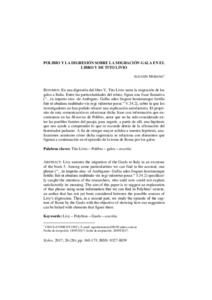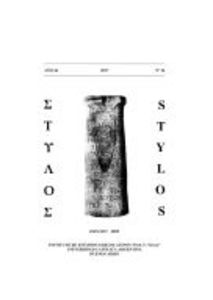Please use this identifier to cite or link to this item:
https://repositorio.uca.edu.ar/handle/123456789/9735| Título: | Polibio y la digresión sobre la migración gala en el libro v de Tito Livio | Autor: | Moreno, Agustín | Palabras clave: | Tito Livio; Polibio, ca. 200-ca. 120 a.C.; HISTORIA DE ROMA; GALOS | Fecha de publicación: | 2017 | Editorial: | Universidad Católica Argentina. Facultad de Filosofía y Letras. Instituto de estudios grecolatinos "Prof. F. Nóvoa" | Cita: | Moreno, A. Polibio y la digresión sobre la migración gala en el libro v de Tito Livio [en línea]. Stylos. 2017, 26. Disponible en: https://repositorio.uca.edu.ar/handle/123456789/9735 | Resumen: | Resumen: En una digresión del libro V, Tito Livio narra la migración de los galos a Italia. Entre las particularidades del relato, figura una frase llamativa (“…in imperio eius -de Ambigato- Gallia adeo frugum hominumque fertilis fuit ut abudans multitudo vix regi videretur posse.” V.34.2), sobre la que los investigadores no han podido ofrecer una explicación satisfactoria. El propó-sito de esta comunicación es relacionar dicha frase con información que en-contramos en las Historias de Polibio, autor que no ha sido considerado en-tre las posibles fuentes del pasaje, para sugerir, a partir de allí, una hipótesis que nos ayude a comprender lo que se esconde detrás de la afirmación del historiador paduano. A fin de otorgar mayor solidez a nuestra hipótesis, ana-lizaremos asimismo cómo dicha sugerencia se relaciona con elementos que figuran a continuación en el episodio de la toma de Roma por los galos Abstract: Livy narrates the migration of the Gauls to Italy in an excursus of the book 5. Among some particularities we can find in the account, one phrase (“…in imperio eius -of Ambigatus- Gallia adeo frugum hominumque fertilis fuit ut abudans multitudo vix regi videretur posse.” 5.34.2) specifical-ly caught the attention of the researchers, who until now could not explain satisfactorily its meaning. The aim of this paper is to suggest an explanation of that phrase using some information that we can find in Polybius’ oeuvre, an author that has not yet been considered between the possible sources of Livy’s digression. Then, in a second part, we study the episode of the cap-ture of Rome by the Gauls with the objective of showing how our suggestion can be linked with elements that figure there. |
URI: | https://repositorio.uca.edu.ar/handle/123456789/9735 | ISSN: | 0327-8859 | Disciplina: | LITERATURA | Derechos: | Acceso abierto | Fuente: | Stylos Nº 26, 2017 |
| Appears in Collections: | STY - 2017 nro. 26 |
Files in This Item:
| File | Description | Size | Format | |
|---|---|---|---|---|
| polibio-digresion-tito-livio.pdf | 217,29 kB | Adobe PDF |  View/Open | |
| stylos26.jpg | 106,33 kB | JPEG |  View/Open |
Page view(s)
298
checked on Feb 9, 2026
Download(s)
317
checked on Feb 9, 2026
Google ScholarTM
Check
This item is licensed under a Creative Commons License

